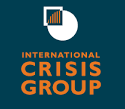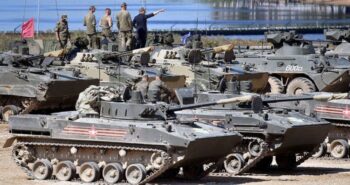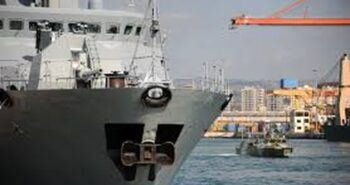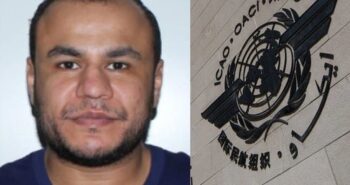 The death of Chadian President Idriss Déby raises the concern of many Chadians and neighboring states and plunges the country into uncertainty. Crisis Group looks back on recent events and outlines the main risks facing the country.
The death of Chadian President Idriss Déby raises the concern of many Chadians and neighboring states and plunges the country into uncertainty. Crisis Group looks back on recent events and outlines the main risks facing the country.
What happened ?
According to official sources, Chadian President Idriss Déby Itno died on Tuesday April 20 at around 1 a.m., following fighting between the Chadian army and the rebellion of the Front for Alternation and Concord in Chad (FACT), not far from Mao in the Kanem region, in the center of the country.
In power for 30 years, Déby had just been re-elected for a sixth consecutive term. His death was announced at 11 a.m. on national television by army spokesman General Azem Bermandoa.
Some observers doubt this version of events and present other, unconfirmed hypotheses about the circumstances of his death, in particular that of a negotiation meeting with members of the FACT which would have turned into a shooting.
The fact that President Déby himself went to the battlefield is not a surprise. Coming to power in 1990, following a coup against President Hissène Habré, whose army he had commanded, Déby has always made his military status his main political force.
His armed forces had succeeded in repelling rebel assaults in 2006 and 2008, and most recently in 2019, thanks to the support of the French army, and he did not hesitate to go into combat himself.
In April 2020, he took the lead in a counter-offensive against a faction of Boko Haram, which had just killed nearly 100 Chadian soldiers on the shores of Lake Chad.
Its commitment on the ground enabled it to mobilize and galvanize its troops and, at the same time, to stand as the guarantor of the integrity of the national territory.
Who are these rebels who entered Chad ?
They are members of FACT, a Chadian politico-military group based in Libya which is said to be made up of one to a thousand and a half combatants.
The group was founded in 2016 by General Mahamat Mahdi Ali in Tanoua, northern Chad, following a split from the rebel group Union des forces pour la democratie et le développement (UFDD) of the former Minister of Defense of Déby, Mahamat Nouri.
Originally from Salal, in the central region of Barh el Gazal, Mahamat Mahdi Ali, who studied in France, participated in several armed movements in Tibesti, Darfur and Libya and claims to fight for a change of power in Chad .
These routes are frequent. The country has experienced many rebellions, most often from the north and east.
The recent FACT offensive also takes place in a particular domestic context. The rebels of this movement launch their first incursion on the day of the Chadian presidential election, April 11, 2021.
They intend to exploit a tense electoral context to call for a convergence of the struggles. In their press releases released in mid-April, they launch an “appeal to the democratic opposition, to civil society and to the Chadian people, to maintain the momentum of pressure on the regime” to help the armed struggle.
This call is little followed by civil society organizations and opposition parties, who in a press release call on the belligerents on each side to observe a ceasefire.
On April 11, the heavily armed vehicles of FACT fighters advance through the sparsely populated desert region of Tibesti. On April 15, the rebels suffered the first strikes by the Chadian air force in Zouarké. At the same time, several other rebel groups, including the Union of Resistance Forces (UFR) and the UFDD, also based in Libya, publicly declared their support for FACT, but did not support it on the ground.
The first major clashes between FACT combatants and Chadian soldiers took place on April 17, north of Mao, more than 300 kilometers from N’Djamena.
The Chadian authorities say they have killed 300 rebels and taken 150 prisoners. On the evening of April 18, the leader of FACT, Mahamat Mahdi, admitted having lost men and operated a strategic withdrawal further north, while waiting to launch new offensives.
But, at the same time, several sources close to the opposition indicate that the fighting is still ongoing and that the losses on the side of the Chadian army are important, including among the high ranking officers. In a FACT press release, President Déby was cited among the wounded.
What is the link between Libya, where the incursion was launched, and recent events ?
The rebel incursion into Chad from southern Libya came as we witness major advances in the peace process in Libya. Last October, the two Libyan military coalitions – one led by authorities based in Tripoli and the other by Marshal Khalifa Haftar, head of the Libyan National Army based in eastern Libya – signed a ceasefire agreement.
In March, these rival factions agreed to form a new interim government to unify the country. A central provision of the ceasefire agreement provided for the departure of foreign forces, including Chadians, which served as backup forces and were funded for years by the various Libyan military coalitions.
Presented as a priority, however, it is slow to be implemented in the field. If some Chadian rebel groups have, since February 2021, tried to form coalitions in anticipation of future tensions with the Libyan authorities, they have not yet been subjected to strong pressure forcing them to leave the territory. International attention has focused more on mercenaries backed by Russia and Turkey.
The FACT incursion into Chad was made possible by the group’s level of armament and equipment, which is higher than that of other Chadian rebel groups.
This is undoubtedly the result, in part, of the co-opting of its fighters into the ranks of Haftar’s forces. The FACT rebels would thus have taken possession of armored vehicles and heavy artillery that Haftar’s external support had provided him before the Tripoli war in 2019.
According to a report by the United Nations group of experts on Libya, FACT forces did not participate but were reportedly tasked with protecting military installations in the center of the country as early as 2017, and in the south after Haftar forces took control in February 2019.
It is therefore plausible that the FACT fighters were able to develop a strike force in contact with the Libyan national army. Haftar’s forces have not publicly commented on the FACT incursion into Chad but privately deny any proximity to the group.
Be that as it may, the events which have just unfolded in Chad once again show that the arming of foreign forces in Libya can have consequences for the stability of the entire region.
The events which have just unfolded in Chad show once again that the arming of foreign forces in Libya can have consequences for the stability of the entire region.
What are the consequences of Déby’s death for Chad’s neighbors ?
The leaders of several neighboring countries have expressed their sorrow and deep concern at the news of the death of President Déby. Chad had previously enjoyed relative stability in a very troubled regional environment.
In addition, Chad is a key player in the fight against jihadist groups in the Lake Chad basin, where it intervened in 2014 at the request of its Nigerian and Cameroonian neighbors to fight against Boko Haram factions, but also in Sahel.
The death of the Chadian president is a blow to the G5 Sahel – a regional cooperation framework created in 2014 to respond to security and development challenges in the region – in which Chad plays a leading military role and of which Déby was the president in exercise.
Also contributing troops to the United Nations Multidimensional Integrated Stabilization Mission in Mali (Minusma) – with more than 1,400 peacekeepers deployed between Tessalit, Aguelhok and Kidal in Mali – Chad, in February, deployed 1,200 men as part of the G5 Sahel Joint Force, in the very sensitive area of the three borders (Burkina Faso, Mali and Niger).
Today, questions are emerging about the future of these contingents and their possible repatriation to deal with internal problems. If this were to be the case, it could have repercussions on the readjustment of the security arrangements of Chad’s allies in the Sahel, and in particular of France.
What is the situation in Chad today and what risks does the country face ?
Immediately after the death of President Déby, the army announced the establishment, by decree, of a military council responsible for ensuring an eighteen-month transition, and promised the forthcoming organization of “free and transparent ”.
Led by the son of the late president, Mahamat Idriss Déby, 37, general at the head of the elite troops of the General Directorate of Security Services of State Institutions, this council is made up of fifteen members who have all held positions leading functions within the security services.
Abakar Abdelkarim Daoud, Chief of Staff of the Armed Forces, Taher Erda Taïro, Director General of Military Intelligence, as well as former Ministers of Public Security, Territorial Administration and the Army are members.
Very quickly, the council took a series of measures including the suspension of the Constitution, the dissolution of the National Assembly and the government, the adoption of a transition charter, the establishment of a curfew or the closure of land and air borders.
But after a few days of hesitation, he has already returned to some of these measures, explaining that he brings “some clarifications”. Thus, the members of the government in place remain for the moment in function to deal with current affairs and the borders are reopened.
He has already returned to some of these measures, explaining that he brings “some clarifications”. Thus, the members of the government in place remain for the moment in function to deal with current affairs and the borders are reopened. He has already returned to some of these measures, explaining that he brings “some clarifications”.
Thus, the members of the government in place remain for the moment in function to deal with current affairs and the borders are reopened.
The political opposition and part of civil society are strongly critical of the creation of the transitional military council. These actors are worried about the non-respect of the constitutional order – which stipulates that it is incumbent on the President of the National Assembly to lead the transition – and the seizure of power by the military.
For the supporters of the former president, on the other hand, this advice is the only solution to face exceptional circumstances, to guarantee peace and to ensure the defense of the national territory in these troubled times.
Faced with these criticisms, the council is seeking support and has met with the actors of the National Framework for Political Dialogue (CNDP) as well as leaders of influential political parties, including Albert Pahimi Padacké, who came second in the presidential election.
The military council is also committed to forming a transitional government in the coming hours or days. It remains to be seen whether the proposed government will make room for the various political currents and sensitivities of the country and whether the people asked will agree to be part of it.
For the moment, many politicians and figures in civil society categorically reject what they call a “military coup”.
Chad finds itself in a very delicate situation. Politico-military groups have already announced that they are strongly challenging the legitimacy of the military council.
“We intend to continue the offensive”, assured Kingabé Ogouzeimi de Tapol, spokesperson for FACT. If the FACT suffered very heavy human and material losses, the death of President Déby undoubtedly galvanized its armed opponents.
The Military Command Council for the Salvation of the Republic(CCMSR), another Chadian rebel group present in Libya, has announced its support for FACT.
The two groups could, according to some reports, lead a joint offensive on Chadian army positions. New clashes could therefore break out between soldiers and rebels in the days to come, in the provinces or closer to the capital N’Djamena, with the risks that this entails for the civilian population.
At the same time, tensions could move into the streets and lead to a standoff between certain civil society organizations and political parties on the one hand, and the new military authorities on the other.
Finally, other questions remain unanswered. Many wonder if the son of Idriss Déby, who, according to Chadian observers, enjoys a good reputation and the esteem of the soldiers,
In such a volatile context, the immediate priority is the implementation of a ceasefire.
For a peaceful transition, it is important to find ways of reaching a consensus between the military council and its opponents. In such a volatile context, the immediate priority is the implementation of a ceasefire.
It is important that international pressure be exerted on the various actors to promote the achievement of these objectives.
__________




